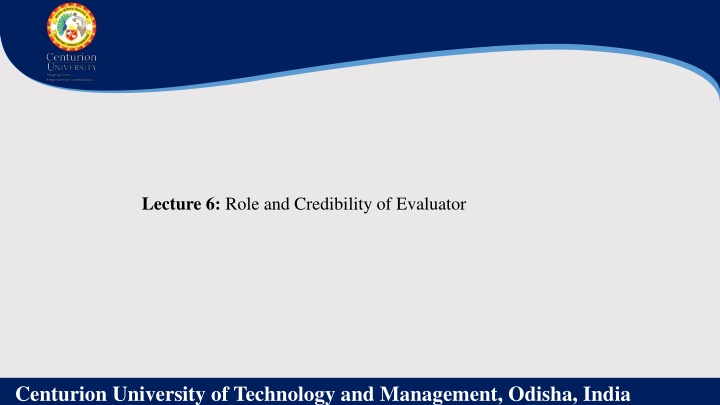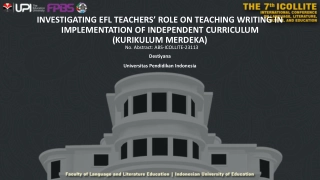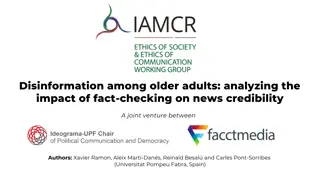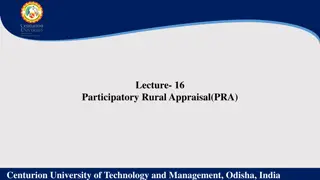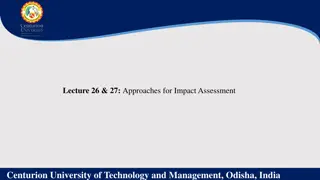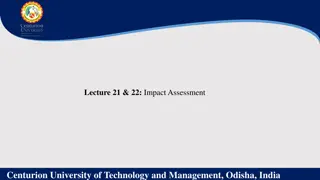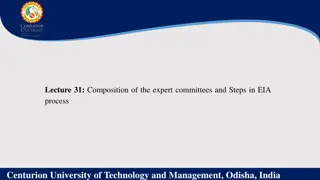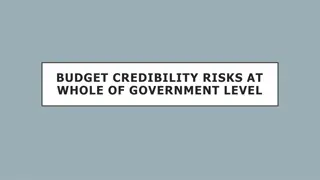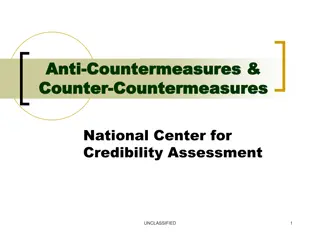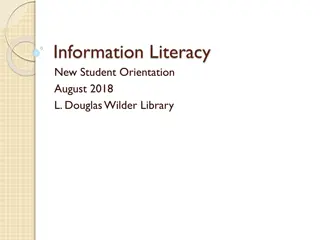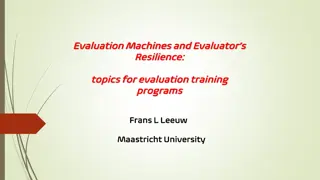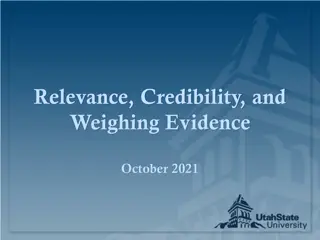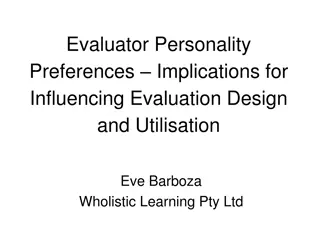Role and Credibility of Evaluator at Centurion University
The role of an evaluator has evolved to encompass diverse responsibilities including planning, designing, collecting, analyzing data, reporting findings, and managing relationships with stakeholders. An evaluator's credibility is judged based on competence and personal style, which includes communication skills, confidence, and nurturing trust. Centurion University in Odisha, India, emphasizes the importance of background knowledge, conceptual skills, and data analysis mastery for evaluators.
Download Presentation

Please find below an Image/Link to download the presentation.
The content on the website is provided AS IS for your information and personal use only. It may not be sold, licensed, or shared on other websites without obtaining consent from the author.If you encounter any issues during the download, it is possible that the publisher has removed the file from their server.
You are allowed to download the files provided on this website for personal or commercial use, subject to the condition that they are used lawfully. All files are the property of their respective owners.
The content on the website is provided AS IS for your information and personal use only. It may not be sold, licensed, or shared on other websites without obtaining consent from the author.
E N D
Presentation Transcript
Lecture 6: Role and Credibility of Evaluator Centurion University of Technology and Management, Odisha, India
Role of the Evaluator The role of an evaluator is continually expanding. The traditional role of an evaluator was a combination of expert, scientist and researcher who uncovered clear-cut cause-and-effect relationships. Today evaluators are often educators, facilitators, consultants, interpreters, mediators and/or change agents. Core Responsibilities of an Evaluator Planning the evaluation: Evaluators plan the evaluation by defining the scope, objectives, and evaluation questions. They also develop a logic model or theory of change that outlines the program s expected inputs, activities, outputs, outcomes, and impacts. Designing the evaluation: Evaluators design the evaluation by selecting appropriate methods and tools, such as surveys, interviews, focus groups, and case studies. They also develop data collection instruments and protocols, including data quality checks and ethical considerations. Collecting and analyzing data: Evaluators collect and analyze data using a range of methods, such as quantitative and qualitative data analysis, statistical analysis, and data visualization techniques. They also conduct data quality checks and ensure the validity and reliability of the data. Centurion University of Technology and Management, Odisha, India
Reporting and presenting findings: Evaluators report and present their findings to stakeholders in clear and concise language. They highlight strengths, weaknesses, and areas for improvement, and make recommendations based on the findings. Ensuring ethical standards: Evaluators adhere to ethical standards in their work, including confidentiality, informed consent, and ensuring the safety and well-being of participants. Managing relationships with stakeholders: Evaluators manage relationships with stakeholders, including program managers, funders, and participants. They communicate effectively with stakeholders and respond to their needs and concerns. Continuous learning and improvement: Evaluators engage in continuous learning and improvement by staying up to date with the latest evaluation methods, tools, and best practices. They also reflect on their own practice and seek feedback from others. Centurion University of Technology and Management, Odisha, India
An Evaluators Credibility An evaluator is judged by his or her competence and personal style. Competence is developed through training and experience. Personal style develops over time through a combination of training, experience and personal characteristics. Competence o Background in the program area being evaluated. o Capacity to understand a program s context, goals and objectives. o Conceptual skills to design the evaluation. o Mastery of qualitative and quantitative approaches to evaluation data collection. o Basic quantitative and qualitative data analysis skills. o Report writing and presentation skills. Centurion University of Technology and Management, Odisha, India
Personal Style o Communication skills. o Confidence. o Strong interpersonal skills. o Ability to nurture trust and rapport. o Sensitivity in reporting Centurion University of Technology and Management, Odisha, India
